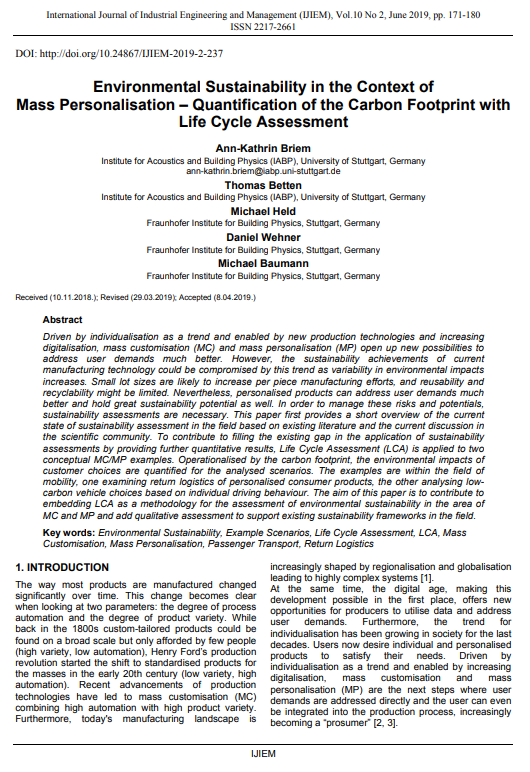Environmental Sustainabilityin the Context of Mass Personalisation – Quantification of the Carbon Footprint with Life Cycle Assessment

Published 2019-06-30
abstract views: 349 // FULL TEXT ARTICLE (PDF): 0
Keywords
- Environmental Sustainability,
- Example Scenarios,
- Life Cycle Assessment,
- LCA,
- Mass Customisation
- Mass Personalisation,
- Passenger Transport,
- Return Logistics ...More
How to Cite
Copyright (c) 2023 International Journal of Industrial Engineering and Management

This work is licensed under a Creative Commons Attribution 4.0 International License.
Abstract
Driven by individualisation as a trend and enabled by new production technologies and increasing digitalisation, mass customisation(MC)and mass personalisation(MP) open up new possibilities to address user demandsmuch better. However, the sustainability achievements of current manufacturing technology could be compromised by this trendas variability in environmental impactsincreases. Small lot sizes are likely to increase per piece manufacturing efforts, and reusability and recyclability might be limited. Nevertheless, personalised products can address user demands much better and hold great sustainability potentialas well.In order to manage these risks and potentials, sustainability assessments are necessary.This paperfirst providesa short overview ofthecurrent state of sustainability assessment in the fieldbased on existing literatureand the current discussion in the scientificcommunity. To contribute to filling the existing gap in the application of sustainability assessments byprovidingfurther quantitative results,Life Cycle Assessment (LCA)is applied to two conceptual MC/MP examples. Operationalised by the carbon footprint, the environmental impacts of customer choices are quantified for the analysed scenarios.The examples are within the field of mobility, one examiningreturn logistics of personalised consumer products, the other analysing low-carbon vehicle choices based on individual driving behaviour.The aim of this paper is to contribute to embedding LCA as a methodology for the assessment of environmental sustainability in the area of MCand MP and add qualitative assessment to support existing sustainability frameworks in the field.
Article history: Received (10.11.2018); Revised (29.03.2019); Accepted (8.04.2019)

